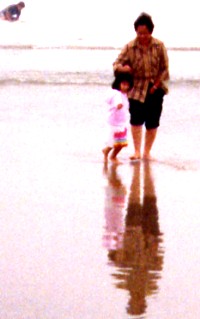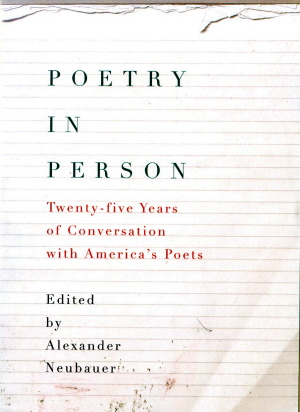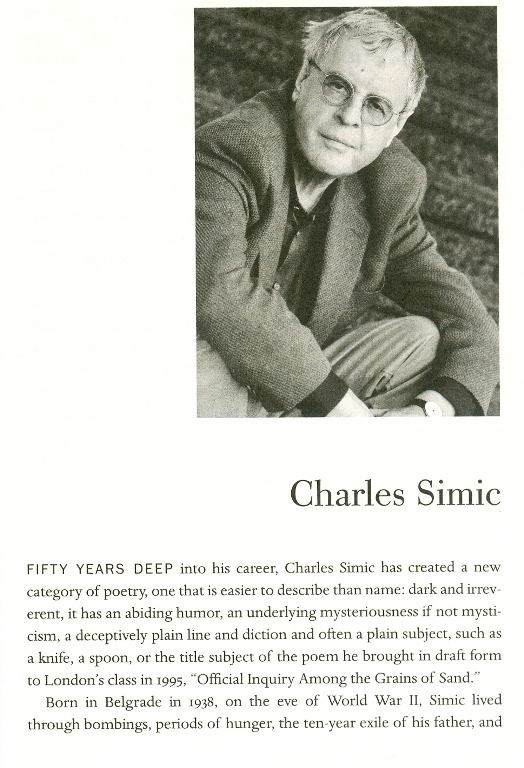 |
  Ed. Alfred
A. Knopf, NY, 2010 FIFTY YEARS
DEEP into his career, Charles Simic has created a new category of
poetry, one
that is easier to describe than name: dark and irreverent, it has an
abiding
humor, an underlying mysteriousness if not mysticism, a deceptively
plain line
and diction and often a plain subject, such as a knife, a spoon, or the
title
subject of the poem he brought in draft form to London's class in 1995,
"Official Inquiry Among the Grains of Sand." Born in
Belgrade in 1938, on the eve of World War II, Simic lived through
bombings,
periods of hunger, the ten-year exile of his father, and the
imprisonment of
his mother. "Hitler and Stalin conspired to make me homeless," he has
said. Not until he was in his mid-teens was his family reunited,
settling in
the United States. Simic began writing poetry as a high school student
in the
Chicago suburbs. One aim of
his poetry, Simic says, is "to restore strangeness to the most familiar
aspects of experience." To London he says that "the foundation of
poetry is based on chance," and as chance can run toward violence,
violence, too, is at an edge not far away. "Official Inquiry" and its
grains of sand run together with a snooping seagull of "a secret
government agency." But even as Simic describes line by line the making
of
the poem, he laughs when London suggests that he might have an overall
vision.
"No. No, I never had a vision," he says. "Sometimes awkwardness
is inevitable and important."
Sinh tại
Belgrade 1938, đêm trước Đệ Nhị Chiến, Simic ‘đau đáu’ kinh qua bom
đạn, đói khát,
và 10 năm lưu vong của ông già và bà mẹ đi tù. “Hitler và Stalin, hai
thằng khốn
này đã âm mưu làm cho tôi thành 1 kẻ không có nhà ở”, ông đã từng nói.
Phải đến
khi ông được 15, 16 tuổi thì gia đình mới được đoàn tụ, và tái định cư
ở Mẽo.
Simic bắt đầu làm thơ khi học trung học ở vùng ngoại ô Chicago. Thơ tôi nhắm
tái lập lại cái “kỳ kỳ cho hầu hết những sắc thái quen thuộc của kinh
nghiệm”. “Cơ
bản của thơ dựa trên cơ may, tình cờ”, và bởi vì cơ may thường chạy tới
bạo động,
thành thử bạo lực thì cũng ngay mép bờ, chẳng ở đâu xa. Và mặc dù ông
làm thơ từng
dòng, từng dòng, khi được hỏi, liệu ông có 1 viễn ảnh lớn, bao trùm lên
nó, nhà
thơ lắc đầu. Nô, tớ chẳng bao giờ có một viễn ảnh. “Đôi khi, cái sự lớ
ngớ thì
không thể tránh được, và nó thì quan trọng”
Charles
Simic - Interview by
Dejan Stojanovic Interview
with Charles Simic This
interview was published
in the Serbian magazine "Views," in August 1991, soon after the war
in the former Charles
Simic (1938) is one
of the most respected and beloved contemporary American poets. He won
the
Pulitzer Prize in 1990 for his book "The World Doesn't End: Prose
Poems," a MacArthur Fellowship, and the Wallace Stevens Award, among
many
other honors. He was appointed the fifteenth Poet Laureate Consultant
in Poetry
to the Library of Congress in 2007. He has published more than 60
books. Stojanovic:
You arrived in Simic:
On a superficial level
I felt quickly comfortable. My English improved to a point where I
could read
books, have friends and know what is going on in popular culture and so
forth.
That took two to three years. The rest of it came slowly as I lived the
same
kind of life my contemporaries did. I was in the army, then there was
the
Vietnam War, the 1960's, etc. etc. After almost forty years in this
country and
all that history, I feel completely at home. Stojanovic:
You are the
recipient of many awards, including the Pulitzer Prize. How much did
getting so
many awards affect you? Simic: My books sell better. My poems are in more high school anthologies. People think I'm very smart. I'm not. Essentially, as our people say: "Every miracle only lasts for three days." Stojanovic:
To what degree in Simic:
There is no
relationship whatsoever. Stojanovic:
What kind of a
role is there for literature today in the most powerful country in the
world? Simic:
Literature is not very
important, especially poetry. I mean, it's nothing in comparison to
film,
television, religion, sports. Still, we have a huge publishing
industry. A lot
of good books come out every year and many very bad ones, and there are
readers
for both. Stojanovic:
Are the
intellectuals in Simic:
There are always, of
course, certain kinds of intellectuals who attach themselves to power,
the
political science types, the Russian experts from major universities,
Kissinger, Bzezinski and that company . . . But the majority of us,
thank God,
stay home and write our books. Stojanovic:
Does
technological progress, in this country and around the world, produce
true
wisdom, or is there a disconnect between the two? Simic:
Are you kidding?
Technology is a product of little wisdom and a lot of greed and
stupidity. In
this country, for instance, we had the best train system in the world
which we
closed down so we could all drive big cars that use a lot of gas and
pollute
the environment. Stojanovic:
How much are
these current times convenient and favorable for the world of art and
progress
in the deeper sense? Simic:
I've no idea. Our age
is probably no worse than any other age. I don't believe in Good Old
Days, nor
do I believe in Progress when it comes to the arts. I've no nostalgia
of any
kind. Stojanovic:
Do you think that
Serbs who have prestige in the world can do more to better the picture
and
image of Simic:
Only to the degree
that they can occasionally correct in public some misinformation. You
realize
that Americans don't care much about the events in Serbs
are not well organized
here and their lobby doesn't have big money and therefore the clout
that others
have. If we could make a large campaign contributions to Senator Dole
he'd
change his tune about Kosovo, he'll even put a picture of St. Sava on
his
office wall. These senators and representatives are like lawyers. Some
of them
are honest, and some are crooks. We pay them money and they represent
our
interests. American Congress is not interested in historical justice.
It may
say it is, but it is not. It simply represents powerful constituencies.
Serbs
with their perennial lack of unity do not represent one, and so they
get no
support. Stojanovic:
How do you view
the current situation in Simic: There's nothing good to be said about people who hate each other and cannot get along. Now you have a civil war. I think all sides are to blame. All these Communists turned democrats, turned neo-fascists nationalists, and the rest. I think Yugoslavs are being fooled by the same people who fooled them and terrorized them yesterday. No one has much to be proud of. I see a lot of vileness and stupidity, and there is, of course, tragedy. People of good will and the innocent suffer as always. Stojanovic:
What, in your
view, is most important for Simic: Serbs cannot go on voting for the same old Communists. They will not get much sympathy anywhere that way . . . What Serbia needs is, of course, democracy and especially the so-called "formal liberties": freedom of thought, expression, association, etc., the most one which is to say NO to the ones in power and suffer no consequences. Stojanovic:
Ideologies and
leaders come and go, but central values stay and often remain the only
light
shining in an often foggy world. How does one return to the basic
values that
the Serbs hold to be true? Simic:
Serbs are talented
people with an honorable history. They've produced exceptional
individuals.
They'll survive. I have no worries about that. On the
other hand, I'm not a
fan of nationalist euphoria. Nationalism is the last refuge of
scoundrels, as
we know. I don't care for that chest-beating either in Stojanovic:
There is no ideal
society, and there are fewer and fewer ideals today in society in
general. What
kind of society would you fight for? Simic:
Democracy is an imperfect
system, but there is no better one. You really have to be a first class
idiot--and I met many among Western intellectuals, for instance--who
used to
assure me thirty years ago in Stojanovic:
What questions
bother you the most--as a poet and as a man? Simic:
I have a grocer in -Dejan
Stojanovic "Pogledi"
("Views"), Serbian Magazine, August 9-23, 1991 (No. 89)
Ông nhận
được bố cu giải thưởng, kể cả
Pulitzer. Nhiều như thế có ảnh hưởng gì tới ông? Ảnh
hưởng khỉ gì. Thơ của tôi bán bảnh hơn nhiều. Chúng xâm nhập nhiều
trường trung học qua những tuyển tập. Mọi người nghĩ, thằng cha thi sĩ
này rất láu cá. Thằng chả khôn lắm! Không, tôi không phải như vậy. Nói
1 cách rốt ráo, thì đúng như… châm ngôn: “Mọi phép lạ chỉ kéo dài được
3 bữa” Tới một mức
độ nào, ở Mẽo, nếu nói về cái
sự thăng bằng giữa 1 bên là những nguyên lý vật chất, và 1 bên là những
nguyên lý về tinh thần? Chẳng
mắc mớ gì hai món đó, nói rõ hơn, chúng không liên hệ với nhau. Mẽo
không phải là 1 xứ sở; nó là 1 đại lục được cư ngụ bởi chồng chất những
truyền thống, văn hóa, tín ngưỡng, một nơi chốn đầy những mâu thuẫn,
ngược ngạo. Cái mâu thuẫn, ngược ngạo nhất, theo tôi, là chúng tôi bằng
1 cách nào đó, cứ sống với nhau hoài hoài như thế, nói như ông VC nào
đó, cầm tay nhau đi dưới bảng hiệu Mẽo quốc! Và đó là cái viễn ảnh hợp
nhất độc nhất. Một lý tưởng về 1 dân tộc, thống nhất và khác biệt. Văn chương
đóng vai trò gì trong
siêu cường số 1 thế giới hiện nay? Văn
chương không quá quan trọng,
đặc biệt là thơ. Tôi muốn nói, chúng chẳng là cái chó gì nếu
so với phim ảnh, truyền hình, tôn giáo. Nói vậy, thì vậy, tuy nhiên
chúng tôi có
1 nền kỹ nghệ xuất bản lớn ra trò. Cả 1 sách tốt được in ra mỗi năm
và rất nhiều sách tệ, và cả hai đều có độc giả. Đám trí
thức Mẽo có ảnh hưởng
gì tới xã hội Mẽo, hay là đường ai nấy đi, tôi muốn nói, họ đuợc sinh
ra là để sống
trong tháp ngà?
Lẽ dĩ
nhiên, luôn có một vài loại
trí thức tự họ cuốn mình vào với quyền lực, những đấng khoa học chính
trị gia,
những chuyên gia về Nga thuộc những đại học lớn, Kissinger, Bzezinski
và cả 1
"còm pa nhi"..... nhưng đa số chúng tôi, nhờ ơn Trời, ở nhà, và viết
những cuốn sách của chúng tôi. Liệu tiến
bộ về kỹ thuật, ở Mẽo,
hay ở lòng dòng đâu đó trên thế giới, sản xuất ra túi
khôn, thứ thực, hay là có đứt đoạn giữa 2 thứ đó? Ông nói
dỡn hả? Kỹ thuật là sản
phẩm của 1 tí ti khôn ngoan, minh triết, và của cả 1 lố ngu si đần độn,
tham lam, ích kỷ… Tại
Mẽo, thí dụ, chúng tôi có một hệ thống xe lửa bảnh nhất, phải nói là
tuyệt hảo,
so với toàn thế giới, vậy mà chúng tôi đóng cửa tiệm, để lái những
chiếc xe hơi
to tổ bố, uống xăng như hạm, và gây ô nhiễm môi trường.
Theo 1
nghĩa sâu thẳm nào đó,
liệu những thời kỳ hiện tại này có “thuận lợi, ưu ái”, một tí ti nào
đối với thế
giới nghệ thuật ? Tôi
không có ý kiến. Thời đại
của chúng ta thì chắc cũng không tệ hại hơn một thời đại khác, có thể
như vậy.
Tôi không tin vào một hoàng kim thời đại xa xưa, và cũng đếch tin ở
tiến bộ, nếu
nói về nghệ thuật. Tôi đếch biết cái gọi là hoài nhớ, bất cứ thứ hoài
nhớ nào. Ông có tin
người Serbs, những
người có thế giá trên thế giới, họ sẽ làm cho hình ảnh một xứ Serb đẹp
đẽ hơn,
tốt đẹp hơn? Chỉ tới
mức độ mà lâu lâu, thỉnh
thoảng, họ sửa sai trước công chúng về một thông tin sai lầm nào đó.
Ông thì cũng
nhận ra là người Mẽo đếch thèm để ý đến những gì xẩy ra ở Ông nghĩ
sao về tình hình ở Chẳng
có gì tốt để mà nói về cái
đám dân chúng ở đó, chúng thù ghét nhau, và hở ra là làm thịt lẫn nhau.
Và bây giờ
thì có 1 cuộc nội chiến, và tôi nghĩ, bên nào thì cũng nhảm, và đều
đáng đem ra
đánh đòn. Tất cả cái đám CS đổi thành Dân Chủ, đổi thành Tân Quốc Gia
Phát Xít, và tất
cả đám còn lại. Tôi nghĩ những người dân Theo quan
điểm của ông, điều gì
thật quan trọng cho xứ sở
|
|